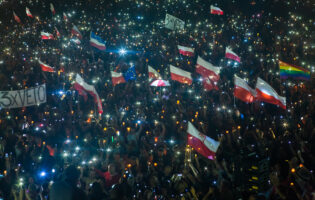Memorializing the Past: the Role of Non-Governmental Actors in German-Polish and Japanese-South Korean Reconciliation
On September 24, 2012, AGI hosted the discussion “Memorializing the Past: Governmental Actors in German-Polish and Japanese-South Korean Reconciliation” with Dr. Seunghoon Emilia Heo and Alexander Wochnik, Harry and Helen Gray Reconciliation Fellows. They presented their work on case study comparisons of German-Polish and Japanese-South Korean reconciliation in terms of religious actors and domestic structures, respectively.
The discussion began with an evaluation of what conditions led to successful reconciliation between Germany and Poland after World War II. This included an acknowledgement of the wrongdoing by the perpetrator state; compensation to the individuals or victim state; a guarantee of security, such as in the resolution of border disputes; and a practical component wherein both states profit. Certain simultaneously occurring factors were identified that influence the success or failure of reconciliation. How reconciliation proceeds is greatly affected by the domestic structures of the states, as they can limit or hinder access of reconciliation tools to non-state actors. Political leadership, while constrained by other factors, is also a strong influence on reconciliation. State interests will impact if and how the leaders decide to move forward. Globalization, which has created a more interconnected world, opens a stage in which other states are able to put pressure on perpetrator states to reconcile. How reconciliation proceeds is also greatly affected by the history between the states, and the current international context.
Mr. Wochnik’s case study looks at memory politics in both postwar Germany and Japan. In Germany, the Federation of Expellees was founded to represent the multitude of Germans who were expelled from Poland and Czechoslovakia at the end of and after World War II. Controversy arose over a planned museum in Berlin dedicated to the German expellees; opponents said that the location of the museum puts the expellee victims on the same level as Holocaust victims. The creation of the museum is going ahead anyways.
In Japan, the controversial Yasukuni shrine, over which the Association of War-Bereaved Families (WBF) has significant influence, is dedicated to the memorialization of Japanese war dead. The WBF works for the welfare of the families of those who died in the Asia Pacific War and lobbies in their interest. However, the shrine has been strongly criticized due to its portrayal of military engagement in a positive light and the removal of controversial events in Japanese history, specifically during World War II. Visits by high-ranking politicians contribute to the controversy, as it is seen as governmental support in the denial of Japanese war crimes.
Dr. Heo’s focus was the limit and potential of religious actors on the reconciliation process. Two memorandum resulting from deep relations among and between Catholics and Protestants in Poland and Germany demonstrated well to what extent a transnational network with a shared religious value could have an impact upon political change of reconciliation. In the case of Japan and South Korea, however, religious actors played a surprisingly little role in reconciliation. Some argue that the state-centered society puts serious obstacle for civil society to get actively engaged while others think that the non-Christian or a-religious element explains the inherent limit of their role. If these arguments are true to certain extent, Heo argues that the difficult position Catholics, Protestants, and Buddhists had to take regarding the Shinto nationalism during the Japanese colonial period impeded them to played an active role in promoting reconciliation. It is only in 1990s that the emerging lay movements became visible. Although not a ‘Catholic’ Poland, the fact that the victim country took initiative in the Polish-German case is an appealing message to South Korea where more than 60% of the population today identifies oneself as religious. More initiatives towards an interfaith dialogue can create opportunity for closer cooperation within and between South Korean and Japanese societies. At a critical time when political leaders shows no hope for reconciliation, non-state actors are called to play a more active role in preventing Northeast Asia to fall into the so-called ‘New Cold War Era’.
Please contact Kimberly Frank with any questions at kfrank@aicgs.org.







